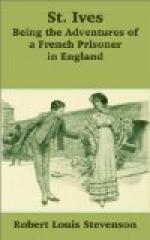It was against my principle, which was to frequent only the dearest inns; and the misadventure that befell me was sufficient to make me more particular in the future. A large company was assembled in the parlour, which was heavy with clouds of tobacco smoke, and brightly lighted up by a roaring fire of coal. Hard by the chimney stood a vacant chair in what I thought an enviable situation, whether for warmth or the pleasure of society; and I was about to take it, when the nearest of the company stopped me with his hand.
‘Beg thy pardon, sir,’ said he; ’but that there chair belongs to a British soldier.’
A chorus of voices enforced and explained. It was one of Lord Wellington’s heroes. He had been wounded under Rowland Hill. He was Colbourne’s right-hand man. In short, this favoured individual appeared to have served with every separate corps, and under every individual general in the Peninsula. Of course I apologised. I had not known. The devil was in it if a soldier had not a right to the best in England. And with that sentiment, which was loudly applauded, I found a corner of a bench, and awaited, with some hopes of entertainment, the return of the hero. He proved, of course, to be a private soldier. I say of course, because no officer could possibly enjoy such heights of popularity. He had been wounded before San Sebastian, and still wore his arm in a sling. What was a great deal worse for him, every member of the company had been plying him with drink. His honest yokel’s countenance blazed as if with fever, his eyes were glazed and looked the two ways, and his feet stumbled as, amidst a murmur of applause, he returned to the midst of his admirers.
Two minutes afterwards I was again posting in the dark along the highway; to explain which sudden movement of retreat I must trouble the reader with a reminiscence of my services.
I lay one night with the out-pickets in Castile. We were in close touch with the enemy; the usual orders had been issued against smoking, fires, and talk, and both armies lay as quiet as mice, when I saw the English sentinel opposite making a signal by holding up his musket. I repeated it, and we both crept together in the dry bed of a stream, which made the demarcation of the armies. It was wine he wanted, of which we had a good provision, and the English had quite run out. He gave me the money, and I, as was the custom, left him my firelock in pledge, and set off for the canteen. When I returned with a skin of wine, behold, it had pleased some uneasy devil of an English officer to withdraw the outposts! Here was a situation with a vengeance, and I looked for nothing but ridicule in the present and punishment in the future. Doubtless our officers winked pretty hard at this interchange of courtesies, but doubtless it would be impossible to wink at so gross a fault, or rather so pitiable a misadventure as mine; and you are to conceive me wandering in the




